For the 2025 school year, there is 1 public preschool serving 530 students in Baker School District.
Public Preschools in Baker School District have a diversity score of 0.35, which is less than the Florida public preschool average of 0.71.
Minority enrollment is 20% of the student body (majority Black), which is less than the Florida public preschool average of 65% (majority Hispanic).
Overview
This School District
This State (FL)
# Schools
9 Schools
1,902 Schools
# Students
4,929 Students
1,124,074 Students
# Teachers
288 Teachers
71,061 Teachers
Student : Teacher Ratio
17:1
17:1
District Rank
Baker School District, which is ranked within the bottom 50% of all 73 school districts in Florida (based off of combined math and reading proficiency testing data) for the 2021-2022 school year.
The school district's graduation rate of 81% has stayed relatively flat over five school years.
Overall District Rank
#39 out of 73 school districts
(Bottom 50%)
(Bottom 50%)
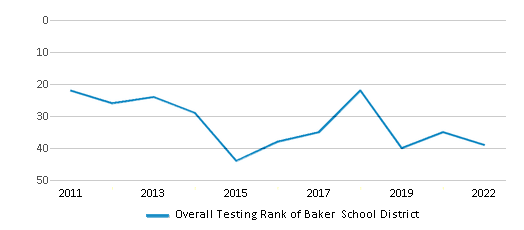
Math Test Scores (% Proficient)
52%
52%
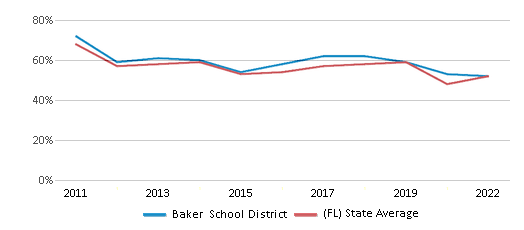
Reading/Language Arts Test Scores (% Proficient)
50%
52%
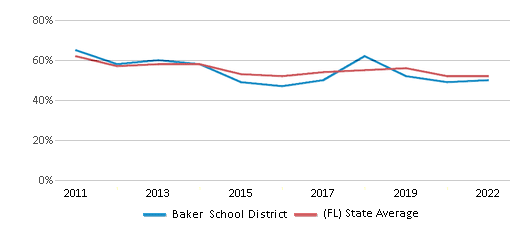
Science Test Scores (% Proficient)
46%
52%
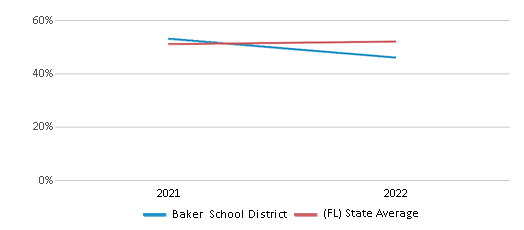
Graduation Rate
81%
87%
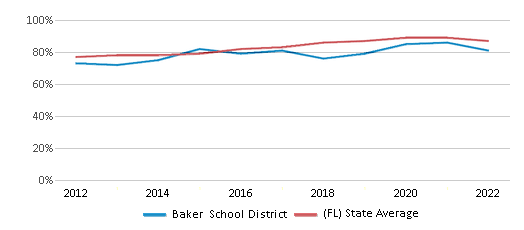
Students by Ethnicity:
Diversity Score
0.37
0.71
# American Indian Students
16 Students
2,515 Students
% American Indian Students
n/a
n/a
# Asian Students
36 Students
28,808 Students
% Asian Students
1%
3%
# Hispanic Students
189 Students
409,820 Students
% Hispanic Students
4%
36%
# Black Students
600 Students
236,066 Students
% Black Students
12%
21%
# White Students
3,854 Students
392,557 Students
% White Students
78%
35%
# Hawaiian Students
4 Students
1,696 Students
% Hawaiian Students
n/a
n/a
# Two or more races Students
230 Students
52,612 Students
% of Two or more races Students
5%
5%
Students by Grade:
# Students in PK Grade:
179
64,349
# Students in K Grade:
351
154,392
# Students in 1st Grade:
388
161,963
# Students in 2nd Grade:
406
167,396
# Students in 3rd Grade:
373
171,016
# Students in 4th Grade:
372
167,752
# Students in 5th Grade:
331
159,415
# Students in 6th Grade:
393
27,337
# Students in 7th Grade:
368
19,963
# Students in 8th Grade:
332
19,106
# Students in 9th Grade:
379
2,380
# Students in 10th Grade:
369
2,273
# Students in 11th Grade:
374
2,437
# Students in 12th Grade:
314
4,295
# Ungraded Students:
-
-
District Revenue and Spending
The revenue/student of $10,680 in this school district is less than the state median of $11,962. The school district revenue/student has stayed relatively flat over four school years.
The school district's spending/student of $10,099 is less than the state median of $11,615. The school district spending/student has stayed relatively flat over four school years.
Total Revenue
$53 MM
$34,349 MM
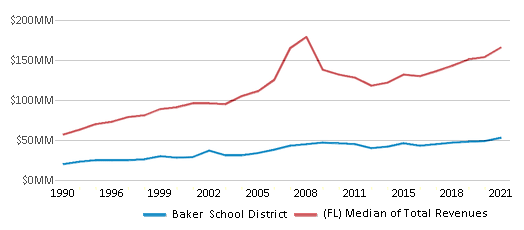
Spending
$50 MM
$33,354 MM
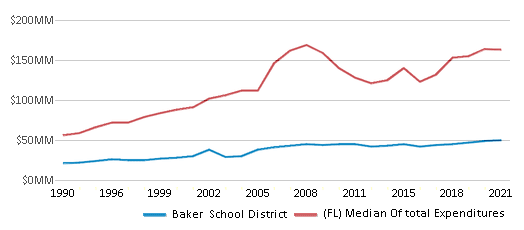
Revenue / Student
$10,680
$11,962
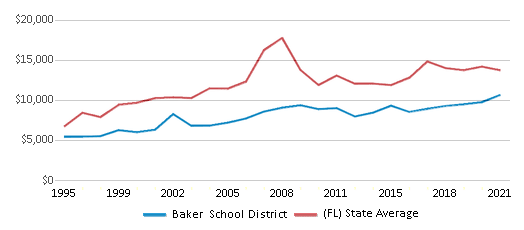
Spending / Student
$10,099
$11,615
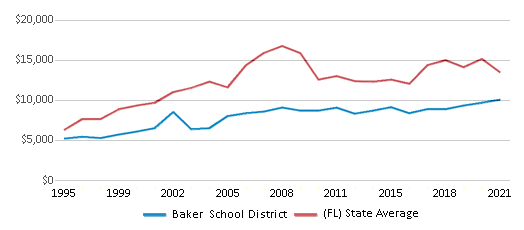
Best Baker School District Public Preschools (2025)
School
(Math and Reading Proficiency)
(Math and Reading Proficiency)
Location
Grades
Students
Rank: n/an/a
362 South Blvd E
Macclenny, FL 32063
(904) 259-0405
Macclenny, FL 32063
(904) 259-0405
Grades: PK-K
| 530 students
Recent Articles

Sexual Harassment at Age 6: The Tale of a First Grade Suspension
A six-year old in Aurora, Colorado, was suspended after singing an LMFAO song to a little girl in his class and reportedly “shaking his booty.” We look at the case and the sexual harassment problem in public schools today.

How Scaffolding Could Change the Way Your Child Learns
This article explores the concept of instructional scaffolding, a teaching method that enhances learning by breaking down complex tasks into manageable parts. It highlights how scaffolding supports students in developing critical thinking skills and becoming more independent learners. The article discusses the benefits of scaffolding, including improved engagement and reduced anxiety, and provides strategies for its implementation across various educational levels.

February 05, 2025
Understanding the U.S. Department of Education: Structure, Impact, and EvolutionWe explore how the Department of Education shapes American education, from its cabinet-level leadership to its impact on millions of students, written for general audiences seeking clarity on this vital institution.





